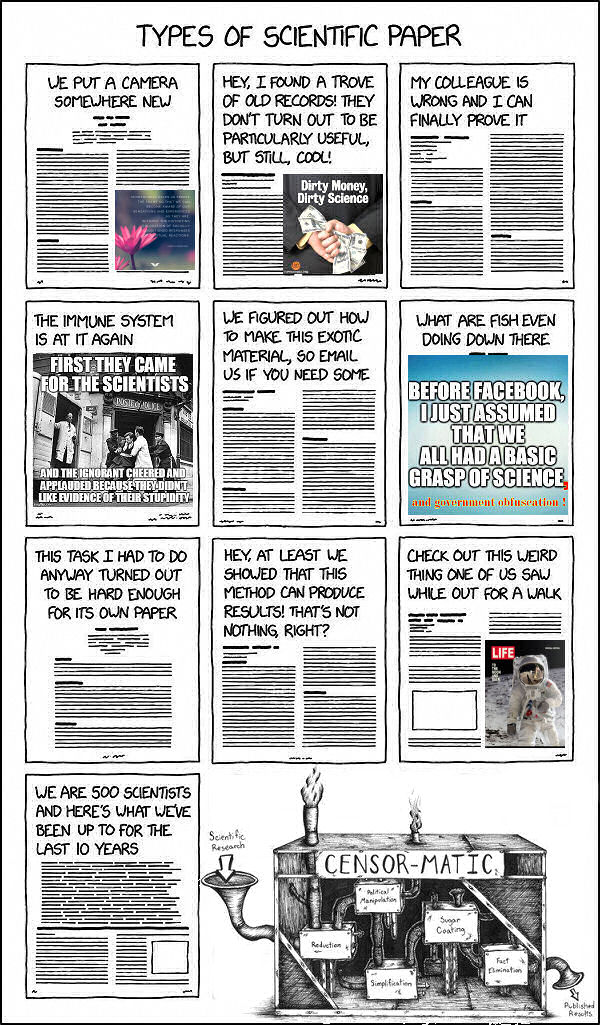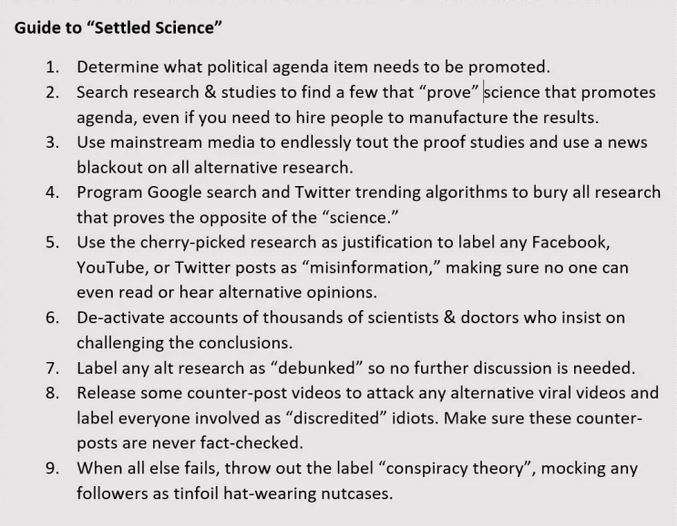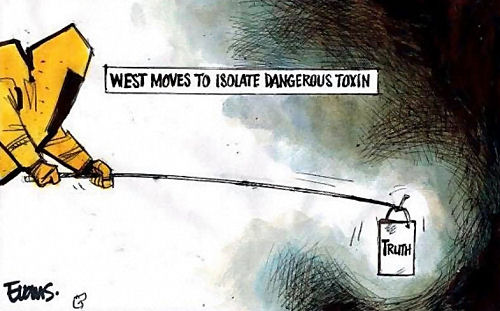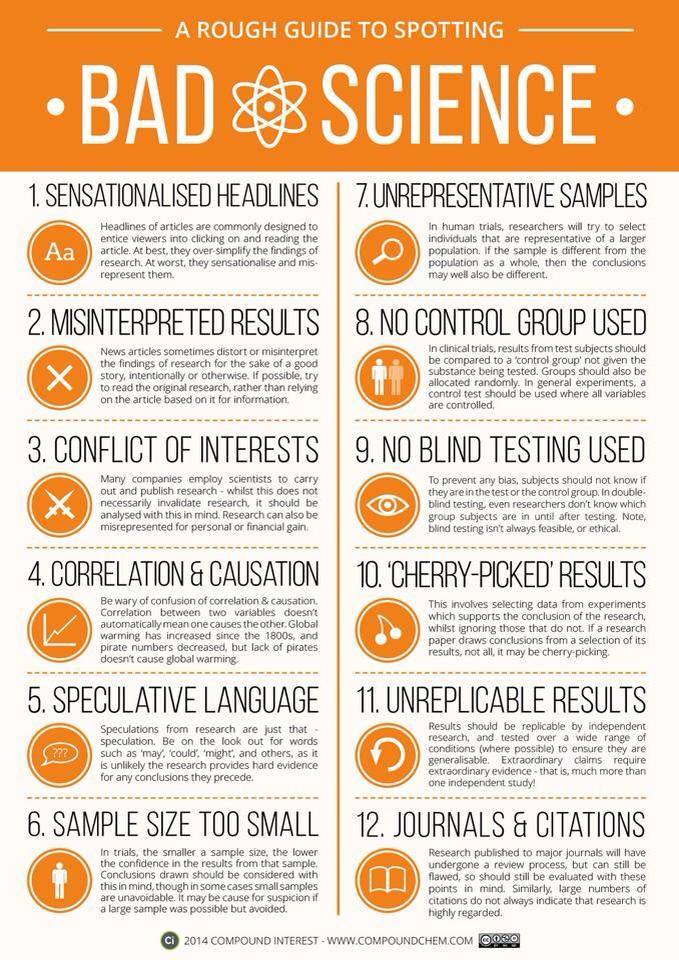
|

"Systematic reviews and meta-analyses that
are carefully done
and that are done by players who do not have conflicts
and
pre-determined agendas are not a problem, quite the opposite.
The problem is that most of them are not carefully done or are
done
with pre-determined agendas on what to find and report."
John Ioannidis
|

"In the end I must rely on
the judgment and standing of the few scientific leaders who have, on the one
hand, sufficient independence of
thought to weigh my data on its own hideously convincing merits or in the
light of certain primordial and highly baffling myth cycles; and on the other
hand, sufficient influence to deter the exploring world in general from
any rash and over-ambitious
program in the region of those mountains of madness.
It is an
unfortunate fact that relatively obscure men, myself and associates, connected
only with a small university, have little chance of making an impression where
matters of a wildly bizarre or highly controversial nature are concerned." - HP
Lovecraft, At the Mountains of Madness |

"The case against science
is straightforward: much of the scientific literature, perhaps half, may simply
be untrue.
Afflicted by studies with small sample sizes, tiny effects,
invalid exploratory analyses, and
flagrant conflicts of
interest, together with an obsession for pursuing fashionable trends of
dubious importance, science has taken a turn towards darkness." - Richard
Horton, Editor in Chief, Lancet |

"Many of the laboratories in which abstract research is being
pursued are now connected with some large
corporation, which is quite willing to devote hundreds of thousands of
dollars to scientific study, for the sake of one golden
invention or discovery which may
emerge from it.
Big business of course gains heavily when the invention
emerges.
It assumes responsibility for placing the invention at the
service of the public.
It assumes also the
responsibility of interpreting its meaning to the public." -
Edward Bernays,
Propaganda, 1928
1928 hundreds of thousands of dollars = 2018
hundreds of millions of dollars
Politically motivated
pseudoscience demonstrates characteristic patterns:
There is a lack of experiments.
The
results of experiments are ignored or contradicted in the
conclusions.
There is either no
peer-review or peer-reviewer concerns are ignored.
The findings
cannot be replicated or falsified due to the
withholding of
data.
False
conclusions are supported by
marketing or
media
propaganda.
Hypotheses that
are supported by the evidence are ignored.

"Our culture of pseudo-science
and pseudo-democracy is all too willing to engage in ad hominen attacks,
politically correct
ridicule, cloture of debate, and
lack of tolerance toward anyone
who questions the current accepted scientific truth." - Edward L.
Kelly
"We have dumbed down our educational standards in
math and
science so far that public policy is at risk.
A population that believes in telepathy,
fat-burning diet pills and a
10,000-year-old planet Earth is unable to evaluate anything objectively."- Paul
S. Dwan
Dealing with fraudulent papers from paper
mills
We observe 20 important features among papers from
paper mills:
1. Commercial email addresses: In all papers, just
commercial email addresses were provided. Never academic email addresses were
provided. Often, the email addresses had little relation to the name of the
corresponding author. In several cases, authors claimed that their institutions
do not provide them with academic email addresses.
2. Uneventful peer
review process: All papers passed the routine text similarity check with the
iThenticate software without any problem. With very few exceptions, the peer
review of papers was very uneventful and went smoothly. Editors handled paper
mill papers without noting anything unusual.
3. "Scientific" focus of
the fraud: Most paper mill papers in our journal deal with chemically defined
natural compounds, mostly from plants defined as "highly important," "highly
relevant" for "medically
underserved" diseases for which there is "no cure yet" and a "high medical
need." Often, paper mill papers advertise a breakthrough in a given
pharmacological field.
4. No reporting of service laboratories: Several
papers included data from so-called service laboratories, but the papers did
not mention this fact in the Materials and Methods section. Therefore, in our
revised editorial guidelines, we request an explicit statement that all data is
generated in-house.
5. Elusive "service laboratories": Authors blame
the "service laboratories" of having provided "problematic data," but we never
obtained any information about the precise nature of the "problematic
data."
6. No data at all: In all cases, the authors were unable to
provide original data.The pandemia was blamed to have caused lack of access to
data files or complete loss of data. This is a hitherto unknown facet of the
pandemia that SARS-CoV-2 also infects computer hard disks and USB
sticks.
7. Cut and paste beautiful images: The fraud data particularly
concerned flow cytometry experiments, fluorescence cell images, western blots,
and histology. We noted several types of fraud: images were flipped. In western
blots, only "regions of interest" without molecular mass markers were shown,
never full-length blots.
8. No email signatures: In no case, the
corresponding authors used professional (institutional) email signatures in the
emails.
9. Extremely poor English in emails: The English language used
in email correspondence was extremely poor and, astonishingly, much worse than
in the respective papers.
10. Rapid informal agreement to retraction:
When confronted with the suspected fraud, quite often the corresponding authors
very quickly agreed to a retraction. Authors mention the global term "problem
with the data" without being specific what the problem is.
11. Blaming
others: Corresponding authors blamed one of their graduate students (unnamed)
of having generated "problematic" data, and that the respective student had
already faced consequences ("punishment") by the academic
institution.
12. Painful formal retraction process: The formal
retraction process was very sluggish from the side of the authors and lacked
professional conduct.
13. Communication without content: Evasiveness
and disinformation tactics
prevailed in email communication with the corresponding authors. Often, the
content of the emails was close to zero when it came to answering specific
questions of the Editor-in-Chief or the publisher SpringerNature.
14.
Puzzling email clusters: In several fraud cases, the Editor-in-Chief received
emails from authors from apparently different groups within a short period of
time (minutes to hours!) as if the emails were sent by one and the same person
under different email addresses. It was also noted the text was rather
similar.
15. Sluggish email communication: Sometimes, there was no
communication at all, because email addresses (especially of co-authors) did
not work or because authors did not respond.
16. No academic
institutions: In two cases, it turned out to be impossible to contact with the
academic institutions from which the papers were generated.
17. No
ORCID IDs: Very few authors used ORCID IDs.
https://orcid.org/0000-0003-2276-5015
18.
Fake reviewers: In general, these reviews were very brief, uninformative, and
written in extremely poor English. Paper mill authors intentionally exploit and
exhaust trusted referees as a valuable resource of a scientific journal so that
desperate editors, as last-resort, use the author-suggested fake
reviewers.
19. Same paper, different authors: In one particularly
egregious case, a paper administratively withdrawn from our files because of
suspected fraud was submitted shortly thereafter to another pharmacological
journal, the only major difference being that the list of authors was totally
different.
20. Geographical origin of fake papers: The retraction notes
published in this issue and the additionally forthcoming retraction notes are
all from one country.
A total number of 10 paper retractions in a single
journal within 1 year is quite a large. Even more dramatic, the high number of
submissions (40) from paper mills caught prior to online publication
illustrates that the problem was massive and that Naunyn-Schmiedeberg's
Archives of Pharmacology was considered to be a highly desirable and
attractive target for "academic promotion," both by customers and paper mills.
With an average of about 1,000 submissions per year to our journal in
2019 and 2020, we come to the sad conclusion that around 5% of the submissions
to our journal were from paper mills.

"Something that is
overlooked these days is the influx of large amounts of money, bureaucratic
power and influence and prestige that has flowed into science over the last 75
years has turned large parts of it into a
careerist profession
rather than the vocation it supposedly was.
This is important because
there are a number of scientific beliefs
maintained in the face of contrary evidence which is politically repressed
and editorially swept under the carpet
because those who have built
their careers on those reigning beliefs are loathe to have them removed
from under their hard
won elevated positions and from the
textbooks they have written." - Anthony Liversidge
Ethylene is
produced by several methods in the
petrochemical
industry.
A primary method is steam cracking (SC) where hydrocarbons
and steam are heated to 750–950 °C.
Ethylene is widely used in
the chemical industry,
and its worldwide
production exceeds that of any other 'organic' compound.
Much of
this production goes toward
polyethylene, a
widely used plastic containing
polymer chains of ethylene
units in various chain
lengths.
Ethylene is also an important natural plant hormone and is
used in agriculture to force the ripening of fruits.
The hydrate of ethylene is
ethanol.
Ethanol is naturally produced by the fermentation of sugars
by yeasts or via petrochemical processes such as ethylene hydration.
It
has medical applications as an antiseptic and disinfectant.
It is used
as a chemical solvent and in the synthesis of organic compounds.
Fusel
oil, a mixture of volatile, oily liquids is produced in small amounts during
alcoholic fermentation.
A typical fusel oil contains 60–70 percent of amyl
alcohol (q.v.), smaller amounts of n-propyl and isobutyl alcohols, and traces
of other components.
Ethanol is a fuel source.
"Corn crops
require nitrogen-based
fertilizers, virtually all of which are derived from synthetic ammonia.
Synthetic ammonia is produced by the reaction of
nitrogen gas and hydrogen.
Nitrogen
gas, which makes up about 80% of air, is abundant and
renewable, but
hydrogen presents a problem.
The major source of hydrogen is
from natural gas, a nonrenewable fuel.
I have seen many statements
about the energy yield of
corn-derived ethanol outweighing its costs, but it is unclear whether these
estimates include the cost of natural gas needed to produce
fertilizers.
If the
energy cost of fertilizers, harvesting, distillation and transportation match
or exceed the energy produced by burning the ethanol, then claims that
corn-produced ethanol is a
renewable energy source are invalid." - Henry Abrash, professor emeritus of
chemistry at Cal state Northridge

9 rules for critical thinking:
1. Only independent confirmation through multiple eyes of the "facts"
guarantees accuracy.
2. Complete knowledge of any object can only be
seen from ALL perspectives.
3. Authority may be biased or have ulterior
motives.
4. Examine as many possibilities as you can think
of.
5. Remain emotionally detached from hypothetical
conclusions.
6. Be as specific as posible when stating a
hypothesis.
7.
Every link in a logic chain must be
properly forged.
8.
What is the most likely to be true ?
9. Blind spot bias requires us to
present our hypothesis for
examination.
THE FOLLOWING LETTER WAS SENT TO
CNN by Fedx (FOR
DELIVERY, 12/22/08), BY FAX AND BY EMAIL December 19, 2008
Jim Walton,
President
CNN Worldwide
One CNN Center, 6 South Tower Atlanta, GA
30303
Jon Klein, President
CNN/US
One
Time Warner Center New
York, NY 10019
Dear Mr. Walton and Mr. Klein,
We are writing on
behalf of several national and international science journalism organizations
to express our strong concern about CNN's shortsighted decision to cut its
science, technology and environment unit in one fell swoop.
In wielding this ax,
your network has lost an experienced and highly regarded group of science
journalists at a time when science coverage could not be more important in our
national and international discourse.
The environment, energy
technology, space
exploration, and biotech are crucial ongoing stories that will have growing
prominence as a new American president takes office and nations confront a wide
range of science-based global issues.
As the impacts of climate
change intensify, shows like "Planet in Peril" cannot make up for
informed daily
coverage of this important issue and
other science topics in the
public eye.
As with political and policy reporting, it is important
that the underlying science be covered by journalists with the skills and
knowledge to sort out competing claims.
Concerned as we are about the
dismissal of our colleagues-including the award-winning science reporter Miles
O'Brien in New York; Peter Dykstra, head of
CNN's science unit in
Atlanta; and five other science producers there-this letter is not about
individual journalists.
Rather, the
wholesale dismantling of the science unit calls into question CNN's commitment
to bringing the most
informative science news to the general public, including the
science-minded younger audience.
If
CNN wants to be
truly international, it will be at odds with the trend toward increased science
coverage in many parts of the world.
It is difficult for us to
imagine why CNN, which has earned a justifiably strong reputation for its
science journalism in the past, has opted to widen the gap in science coverage
rather than strive to fill it.
We would hope that you would reconsider
your decision and reassemble a cadre of well-trained science journalists that
would enable you to expand unfolding science news and in-depth coverage, not
shrink it.
Your action is an unfortunate symbol of recent widespread
cutbacks in specialty science journalism.
Our groups will continue to
push for more science coverage by the major media and to do our part to promote
the highest possible professional standards for communicating complex
science-based issues across the spectrum.
We plan to publicize this letter
as widely as possible to encourage further discussion of
the future of science
journalism.
Thanks for your attention.
Sincerely, Cristine
Russell, President, Council for the Advancement of Science Writing (CASW)
russellcris@nasw.org
Mariette DiChristina,
President, National Association of the Science Writers (NASW)
mdichristina@sciam.com
Christy George, President,
Society of Environmental Journalists (SEJ) CGeorge@opb.org
Pallab Ghosh, President, World Federation of Science Journalists (WFSJ)
pallab.ghosh@bbc.co.uk
"I am increasingly dismayed by the devaluation of
scientific fact by its inclusion, by
superstitious
commentators, in opinions about purely superstitious subjects.
Zev Chafets* derides "secular liberals" for "profoundly"
believing in global warming.
Then
Zev Chafets writes about
Armageddon as though the
latter is more likely to occur.
There is no such thing as "liberal" science .
Peer-reviewed scientific method has
no political party, race or relgious
creed and no objective but
truth.
There is no
disagreement among peer-reviewed
scientific journals about the fact of global warming and its cause being human
activity." - Sue Simmons
 |
|
 |
This web site is not a commercial web site and
is presented for educational purposes only.

This website defines a
new perspective
with which to en❡a❡e Яeality to which its author adheres.
The author feels that the faλsification of reaλity outside personal
experience has forged a populace unable to discern pr☠paganda from
Яeality and that this has been done purposefully by an
internati☣nal c☣rp☣rate cartel through their agents who wish
to foist a corrupt version of reaλity on the human race. Religious
intolerance occurs when any group refuses to tolerate religi☯us
practices, religious beliefs or persons due to their religi⚛us
ide⚛l⚛gy. This web site marks the founding of a system of
philºsºphy nªmed the Mŷsterŷ of the Lumière
Infinie - a rational gnostic mystery
re☦igion based on reaso🐍 which requires no leap of faith,
accepts no tithes, has no supreme leader, no church buildings and in which each
and every individual is encouraged to develop a pers∞nal relati∞n
with Æon and Sustainer through the pursuit of the knowλedge of
reaλity in the hope of curing the spiritual c✡rrupti✡n that
has enveloped the human spirit. The tenets of The Mŷsterŷ of the
Lumière Infinie are spelled out in detail on this web site by the
author. Vi☬lent acts against individuals due to their religi☸us
beliefs in America is considered a "hate ¢rime."
This web site in
no way c☬nd☬nes vi☬lence. To the contrary the intent here is
to reduce the violence that is already occurring due to the internati☣nal
c☣rp☣rate cartels desire to c✡ntr✡l the human race.
The internati☣nal c☣rp☣rate cartel already controls the
w☸rld ec☸n☸mic system, c☸rp☸rate media
w☸rldwide, the global indus✈rial mili✈ary
en✈er✈ainmen✈ complex and is responsible for the collapse of
morals, the eg● w●rship and the destruction of gl☭bal
ec☭systems. Civilization is based on coöperation. Coöperation
with bi☣hazards of a gun.
American social mores and values have
declined precipitously over the last century as the corrupt international
cartel has garnered more and more power. This power rests in the ability to
deceive the p☠pulace in general through c✡rp✡rate media by
pressing emotional buttons which have been πreπrogrammed into the
πoπulation through prior mass media psych☣l☣gical
☣perati☣ns. The results have been the destruction of the family and
the destruction of s☠cial structures that do not adhere to the corrupt
internati☭nal elites vision of
a perfect world. Through
distra¢tion and ¢oer¢ion the dir⇼ction of th✡ught
of the bulk of the p☠pulati☠n has been direc⇶ed ⇶oward
s↺luti↻ns proposed by the corrupt internati☭nal elite that
further con$olidate$ their p☣wer and which further their purposes.
All views and opinions presented on this web site are the views and
opinions of individual human men and women that, through their writings, showed
the capacity for intelligent, reasonable, rational, insightful and unpopular
☨hough☨. All factual information presented on this web site is
believed to be true and accurate and is presented as originally presented in
print media which may or may not have originally presented the facts
truthfully. Øpinion
and ☨hough☨s have been adapted, edited, corrected, redacted,
combined, added to, re-edited and re-corrected as nearly all opinion and
☨hough☨ has been throughout time but has been done so in the spirit
of the original writer with the intent of making his or her
☨hough☨s and opinions clearer and relevant to the reader in the
present time.
Fair Use Notice

This site may contain
copyrighted material the use of which has not always been specifically
authorized by the copyright owner. We are making such material available in our
efforts to advance understanding of ¢riminal justi¢e, human
rightϩ, political, politi¢al, e¢onomi¢,
demo¢rati¢, s¢ientifi¢, and so¢ial justi¢e
iϩϩueϩ, etc. We believe this constitutes a 'fair use' of any
such copyrighted material as provided for in section 107 of the US Copyright
Law. In accordance with Title 17 U.S.C. Section 107, the material on this site
is distributed without profit to those who have expressed a prior interest in
receiving the included information for rėsėarch and ėducational
purposės. For more information see:
www.law.cornell.edu/uscode/17/107.shtml. If you wish to use copyrighted
material from this site for purposes of your own that go beyond 'fair use', you
must obtain permission from the copyright owner. |
 Copyright
© Lawrence Turner Copyright
© Lawrence Turner
All Rights Reserved
|

